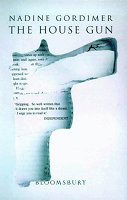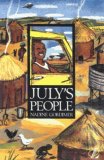
|

 THE HOUSE GUN by Nadine Gordimer (hier online bestellen)
THE HOUSE GUN by Nadine Gordimer (hier online bestellen)
If you want to buy this book second hand (paperback, as good as new),
send me an eMail
The price of it is € 9 incl. postage.
The story:
Privileged whites in post-apartheid South Africa, Harald and Claudia Lindgard have managed to live the better
part of 50 years without ever confronting the deepest shadows in their culture or in their own souls. Though
they conceive of themselves as liberal- minded, neither has ever taken any active political stand; neither has
ever been in any black person's home. Harald sits on the board of an insurance company; Claudia is a
compassionate doctor. Neither of them has ever been inside a courtroom before; neither has ever been inside a
prison. When their architect-son Duncan is arrested for murder, both know that the charge is preposterous.
But Duncan himself fails to deny his guilt and his parents are brought by a harsh and ungainly process to
accept the possibility that he has committed an unthinkable crime.
Nadine Gordimer's The House Gun is a gravely sustained exploration of their long-delayed but necessary descent
into an intimate acquaintance with the culture of violence that surrounds them and that is "the common hell of
all who are associated with it." The novel is a mystery, but not in the usual sense of the whodunit. Here the
question of who quickly gives way to why and thence to other, still deeper quandaries of culpability, both
immediate and ultimate. The enigmatic Duncan becomes a dark mirror in which his stunned parents must
desperately grope for a new vision of themselves and their world--a vision that will not shatter, as their
old one has, under a single blow from reality.
Gordimer's prose is mannered and severe; humour is rare or absent. "As the couple emerge into the foyer of
the courts, vast and lofty cathedral echoing with the susurration of its different kind of supplicants gathered
there, Claudia suddenly breaks away, disappearing towards the sign indicating toilets. Harald waits for her
among these people patient in trouble, no choice to be otherwise, for them, he is one of them, the wives,
husbands, fathers, lovers, children of forgers, thieves and murderers." This difficult exposition is the
reader's own dark mirror, where we as spectators fumble from one dubious explanation to the next--a twisted
reflection always reminding us that, underlying this social tragedy, there is a mystery play in the old
sense and an unanswerable question: What is a human being? Paragraph after paragraph, the reader is led into
deeper and deeper perceptions of the sensibilities and the dilemmas of these characters--into a quiet intimacy
with their trouble that is sometimes acutely uncomfortable, but which pays off richly in an ending that
reconciles our sense of the horror of violence with our desire to believe in the value of each life.
Extract from book:
"...David Baker and Nkululeko 'Khulu' Dladla came home at 7.15 p.m. and found the body of their friend Carl
Jespersen in the living-room. He had a bullet-wound in the head. He was lying half-on, half-off the sofa, as if
(interpretation) he had been taken by surprise when shot and had tried to rise. He was wearing thonged sandals, one of
which was twisted, hanging off his foot, and beneath a towelling dressing-gown he was naked. There were glasses on
an African drum beside the sofa. One held the dregs of what appeared to have been a mixture known as a Bloody
Mary - an empty tin of tomato juice and a bottle of vodka were on top of the television set. The other glasses
were apparently unused; there was an unopened bottle if whisky and a bucket of half-melted ice on a tray on
the floor beside the drum. (Evidence combined with interpretation.) There was no unusual disorder in the room;
this is a casual bachelor household. .......
The garden is one in which a cottage is sited. The cottage is occupied by Duncan Lingard, a mutual friend
of the dead man and the two men who discovered him, and they ran to him after they had discovered Jerspersen's body.
Lingard's dog was asleep outside the cottage and apparantly there was no-one at home. The police came about
twenty minutes later. A man, a plumber's assistant, Petrus Ntuli, who occupied an outhouse on the property in exchange
for work in the garden, was questioned and said that he had seen Lingard come out on the verandah of the house and drop
something as he crossed the garden to the cottage. Ntuli thought he would retrieve whatever it was, for Lingard,
but could not find anything. He called out to Lingard but Lingard had already entered the cottage. Ntuli did not
have a watch. He could not say what time this was, but the sun was down. The police searched the garden and found
a gun in a clump of fern. Baker and Dladla immediately identified it as the gun kept in the house as mutual protection against
burglars; neither could recall in which of their three names it was licensed. The police proceeded to the cottage.
There was no response to knocking on the door, but Ntuli insisted that Lingard was inside. The police then effected
entry by forcing the kitchen door and found that Lingard was in the bedroom. He seemed dazed. He said he had been asleep.
Asked whether he knew his friend Carl Jespersen had been attacked, he went white in the face (interpretation) and
demanded, Is he dead?...."
About the author:
 Nadine Gordimer was born in 1923 in Springs, a small gold-mining town thirty miles from Johannesburg. Her
parents were Jewish émigrés, her mother from England and her father from Latvia; he ran a jewelry store in
town, where Gordimer attended an all-white convent school. Gordimer credits Upton Sinclair's 1906 novel The
Jungle, about oppressed Chicago meatpackers, with opening her eyes to the plight of the black mine workers
in Springs. Her focus, though, in life as well as work, has always been on the individual experience. In a
1991 interview in The New York Times, Gordimer describes being "drawn into politics not through ideas but
through friendships with many black people through the years. Little by little, I began to see what I was
part of."
Nadine Gordimer was born in 1923 in Springs, a small gold-mining town thirty miles from Johannesburg. Her
parents were Jewish émigrés, her mother from England and her father from Latvia; he ran a jewelry store in
town, where Gordimer attended an all-white convent school. Gordimer credits Upton Sinclair's 1906 novel The
Jungle, about oppressed Chicago meatpackers, with opening her eyes to the plight of the black mine workers
in Springs. Her focus, though, in life as well as work, has always been on the individual experience. In a
1991 interview in The New York Times, Gordimer describes being "drawn into politics not through ideas but
through friendships with many black people through the years. Little by little, I began to see what I was
part of."
Gordimer's first short story was published when she was fifteen. Her writing career took off when The New
Yorker printed a story in 1946, her first collection appeared three years later. She has since published
seven volumes of short stories and twelve novels, which have been translated into thirty languages. Gordimer
has won some of the most prestigious literary awards in the world, culminating in the Nobel Prize for
Literature in 1991. She has been given honorary degrees from Yale, Harvard, and other universities and has
been honored by the French government with the decoration Commandeur de l'Ordre des Artes et des Lettres.
A vocal member of the long-outlawed African National Congress, she is also a founder of the predominantly
black Congress of South African Writers. Nadine Gordimer has long been considered a preeminent interpreter
of South Africa, and also its conscience.
Buchdaten:
THE HOUSE GUN by Nadine Gordimer
Sprache: Englisch
Broschiert
Erscheinungsdatum: Januar 2000
ISBN: 0747544468
Preis: € 9,60
More works from the same author:
zurück zur Übersicht
|
 THE HOUSE GUN by Nadine Gordimer (hier online bestellen)
THE HOUSE GUN by Nadine Gordimer (hier online bestellen)
 Nadine Gordimer was born in 1923 in Springs, a small gold-mining town thirty miles from Johannesburg. Her
parents were Jewish émigrés, her mother from England and her father from Latvia; he ran a jewelry store in
town, where Gordimer attended an all-white convent school. Gordimer credits Upton Sinclair's 1906 novel The
Jungle, about oppressed Chicago meatpackers, with opening her eyes to the plight of the black mine workers
in Springs. Her focus, though, in life as well as work, has always been on the individual experience. In a
1991 interview in The New York Times, Gordimer describes being "drawn into politics not through ideas but
through friendships with many black people through the years. Little by little, I began to see what I was
part of."
Nadine Gordimer was born in 1923 in Springs, a small gold-mining town thirty miles from Johannesburg. Her
parents were Jewish émigrés, her mother from England and her father from Latvia; he ran a jewelry store in
town, where Gordimer attended an all-white convent school. Gordimer credits Upton Sinclair's 1906 novel The
Jungle, about oppressed Chicago meatpackers, with opening her eyes to the plight of the black mine workers
in Springs. Her focus, though, in life as well as work, has always been on the individual experience. In a
1991 interview in The New York Times, Gordimer describes being "drawn into politics not through ideas but
through friendships with many black people through the years. Little by little, I began to see what I was
part of."



